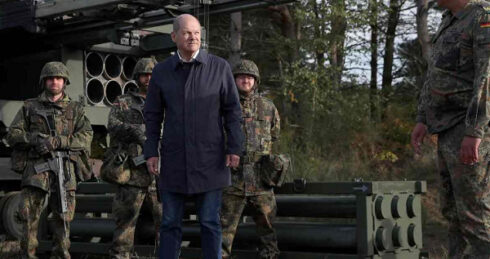Written by Ahmed Adel, Cairo-based geopolitics and political economy researcher
The combat capacity of the German Armed Forces, the Bundeswehr, has been seriously weakened by the shortage caused by the continuous supplies of material and ammunition to Kiev, said Johann Wadephul, German deputy of the opposition Christian Democratic Union (CDU) party. His comments come as it was discovered nearly half of Germans want to see the coalition government dissolved.
“Crucial [German] troop units can only last a maximum of two days in a battle [due to these shortages]. And that is a catastrophic finding overall,” Wadephul said. “Anyone who even talks about being ready for war, but expects the Bundeswehr to be at least ready to defend itself, should have ensured that such a bad situation does not occur. Unfortunately, the opposite is the case.”
Wadephul argued that the process of improving the combat capacity of the country’s armed forces was slow and blamed the German defence minister, Boris Pistorius, for the current state of things. He added that he sees high-sounding statements but little real action to change the current situation.
According to the politician, “the turning point” for the Bundeswehr has not yet arrived.
“Even when it comes to replacement procurement, the Bundeswehr is actually making a loss. As correct as the donations to Ukraine are in terms of material and ammunition, in the current security situation, it is unacceptable that there is no compensation,” Wadephul said. “We need much more [weapons] than we have had.”
Wadephul’s warnings about the weakened state of the Bundeswehr come after the CEO of German steel giant Salzgitter Steel, Gunnar Groebler, warned that Germany will face deindustrialisation if companies continue to move production out of the country. In his words, the German government’s refusal to import Russian energy resources has worsened the industrial economic climate.
According to the German Chamber of Commerce and Industry, 32% of the companies surveyed are inclined to invest abroad amid “concern over a future without cheap Russian gas,” highlights the Financial Times.
The CEO of Germany’s second-largest steel company warned that large energy users must commit to the country as a basis to avoid the progressive deindustrialisation of Europe’s largest economy.
“If I were to follow that lead, then we are going to deindustrialise this country,” Groebler told the Financial Times.
The CEO stressed that if suppliers of raw materials for industry, such as steel and chemicals, leave Germany due to high energy prices, there is a risk of losing the entire value chain.
According to several economists cited in mid-October, Germany’s GDP declined 0.2% in the second quarter and will likely fall another 0.1% before the end of 2023. Recently, the German Constitutional Court prohibited the government from taking out new loans, so the country faces a freeze in public spending.
Almost half of Germans are in favour of dissolving the current government of Chancellor Olaf Scholz, and about a third blame him for the suspended budget, according to a survey carried out on November 24 by the sociological institute Civey for the German magazine Focus.
According to the survey, 49% of respondents want to see the “traffic light coalition” government, formed by Scholz’s Social Democratic Party (SPD), the Free Democratic Party (FDP) and the Greens, dissolved. Respondents believe it would be better for the SPD to join the alliance of the German Christian Democratic Union (CDU) and the Bavarian Christian Social Union (CSU) to form a new government.
Another 48% said the coalition’s plight could be due to a billion-euro hole in the German budget, which was created when a court ruled that redistributing money from unclaimed loans from previous years was illegal. As a result, the cabinet has lost the confidence of 64% of the population, according to the survey.
Respondents were almost evenly divided when asked who should be held responsible for the budget debacle: 28% blamed Scholz, 27% blamed Economy Minister Robert Habeck of the Greens, and 25% blamed the Minister of the Treasury, Christian Lindner, of the FDP.
With the Bundeswehr in its weakest state in decades, companies threatening to leave the country due to crippling energy prices caused by the sanctions on Russian energy, and the current budget debacles, it is easy to see why Germans are frustrated with this government. These issues will unlikely be alleviated until Berlin returns to normalcy with Moscow.







but nobody will attack germany, they have no enemy. war is about resources and the country that has the most resources in the world is russia. they are the target.
the anglozionazi empire of filth tried once and the nazi part got squashed. this time however, the entire triumvirate of demons is getting squashed. and their beautiful zionazi project in khazar occupied palestine is already burning even as its $lumville golem sinks into financial ruin. isn’t karma wonderful?
the pathetic hollow man in the empty suit that germanistan calls its “leader”, together with his collection of retarded greenies destroying that once proud nation, are managing to reduce all of urupp to financial ruin and total vassal status under the cadaver-in-chief in the washing town sewer. what took stasi erika merkill almost 20 years, the current bum and his invisible “beard” are doing in a fraction of that. the eussr is doomed, thank goodness.
scholz will run the country on schmalz
if he asks nicely, russia will send him chicken gizzards.
1) nonsense. cdu is just as bad and responsible. military budget has been upped another 30%. (after billions spent in addition).
2) the polls are wrong, the current government has far less support. lots of votes (if counted) will go to other parties.
3) cdu has fully supported anti-russian measures. if at all, only new parties can bring change.
stupid assclown articel as always
voll nazi gets pithy